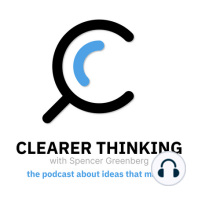100 min listen

Beyond cognitive biases: improving judgment by reducing noise (with Daniel Kahneman)
Beyond cognitive biases: improving judgment by reducing noise (with Daniel Kahneman)
ratings:
Length:
75 minutes
Released:
Sep 23, 2021
Format:
Podcast episode
Description
Read the full transcriptHow can we apply the theory of measurement accuracy to human judgments? How can cognitive biases affect both the bias term and the noise term in measurement error? How much noise should we expect in judgments of various kinds? Is there reason to think that machines will eventually make better decisions than humans in all domains? How does machine decision-making differ (if at all) from human decision-making? In what domains should we work to reduce variance in decision-making? If machines learn use human decisions as training data, then to what extent will human biases become "baked into" machine decisions? And can such biases be compensated for? Are there any domains where human judgment will always be preferable to machine judgment? What does the "fragile families" study tell us about the limits of predicting life outcomes? What does good decision "hygiene" look like? Why do people focus more on bias than noise when trying to reduce error? To what extent can people improve their decision-making abilities? How can we recognize good ideas when we have them? Humans aren't fully rational, but are they irrational?Daniel Kahneman is Professor of Psychology and Public Affairs Emeritus at the Princeton School of Public and International Affairs, the Eugene Higgins Professor of Psychology Emeritus at Princeton University, and a fellow of the Center for Rationality at the Hebrew University in Jerusalem. Dr. Kahneman has held the position of professor of psychology at the Hebrew University in Jerusalem (1970-1978), the University of British Columbia (1978-1986), and the University of California, Berkeley (1986-1994). He is a member of the National Academy of Science, the Philosophical Society, the American Academy of Arts and Sciences, and is a fellow of the American Psychological Association, the American Psychological Society, the Society of Experimental Psychologists, and the Econometric Society. He has been the recipient of many awards, among them the Distinguished Scientific Contribution Award of the American Psychological Association (1982) and the Grawemeyer Prize (2002), both jointly with Amos Tversky, the Warren Medal of the Society of Experimental Psychologists (1995), the Hilgard Award for Career Contributions to General Psychology (1995), the Nobel Prize in Economic Sciences (2002), the Lifetime Contribution Award of the American Psychological Association (2007), and the Presidential Medal of Freedom (2013). He holds honorary degrees from numerous universities. Find out more about him here.Here's the link to the Thought Saver deck that accompanies this episode: https://app.thoughtsaver.com/embed/JGXcbe19e1?start=1&end=17
Released:
Sep 23, 2021
Format:
Podcast episode
Titles in the series (100)
Antagonistic Learning and Civilization with Duncan Sabien by Clearer Thinking with Spencer Greenberg